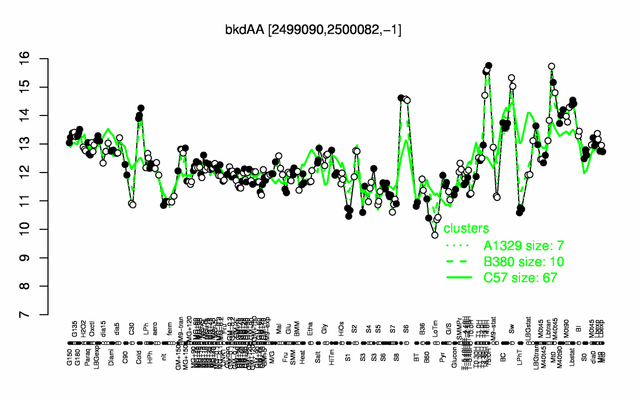Difference between revisions of "BkdAA"
| Line 122: | Line 122: | ||
* '''Additional information:''' | * '''Additional information:''' | ||
| + | ** number of protein molecules per cell (minimal medium with glucose and ammonium): 366 {{PubMed|24696501}} | ||
| + | ** number of protein molecules per cell (complex medium with amino acids, without glucose): 932 {{PubMed|24696501}} | ||
=Biological materials = | =Biological materials = | ||
Revision as of 09:40, 17 April 2014
- Description: 2-oxoisovalerate dehydrogenase (E1 alpha subunit)
| Gene name | bkdAA |
| Synonyms | bfmBAA, bfmB1a, bkd |
| Essential | no |
| Product | 2-oxoisovalerate dehydrogenase (E1 alpha subunit) |
| Function | utilization of branched-chain keto acids |
| Gene expression levels in SubtiExpress: bkdAA | |
| Metabolic function and regulation of this protein in SubtiPathways: bkdAA | |
| MW, pI | 36 kDa, 4.778 |
| Gene length, protein length | 990 bp, 330 aa |
| Immediate neighbours | bkdAB, lpdV |
| Sequences | Protein DNA DNA_with_flanks |
Genetic context 
This image was kindly provided by SubtiList
| |
Expression at a glance PubMed
| |
Contents
Categories containing this gene/protein
This gene is a member of the following regulons
BkdR regulon, CodY regulon, SigL regulon
The gene
Basic information
- Locus tag: BSU24050
Phenotypes of a mutant
Database entries
- BsubCyc: BSU24050
- DBTBS entry: [1]
- SubtiList entry: [2]
Additional information
The protein
Basic information/ Evolution
- Catalyzed reaction/ biological activity: 3-methyl-2-oxobutanoate + [dihydrolipoyllysine-residue (2-methylpropanoyl)transferase] lipoyllysine = [dihydrolipoyllysine-residue (2-methylpropanoyl)transferase] S-(2-methylpropanoyl)dihydrolipoyllysine + CO2 (according to Swiss-Prot)
- Protein family: BCKDHA family (according to Swiss-Prot)
Extended information on the protein
- Kinetic information:
- Domains:
- Modification:
- Cofactor(s):
- Effectors of protein activity:
- Localization: Membrane-proximal (Spotty) PubMed
Database entries
- BsubCyc: BSU24050
- UniProt: P37940
- KEGG entry: [3]
- E.C. number: 1.2.4.4
Additional information
Expression and regulation
- Additional information:
Biological materials
- Mutant:
- Expression vector:
- lacZ fusion:
- GFP fusion:
- two-hybrid system:
- Antibody:
Labs working on this gene/protein
Your additional remarks
References